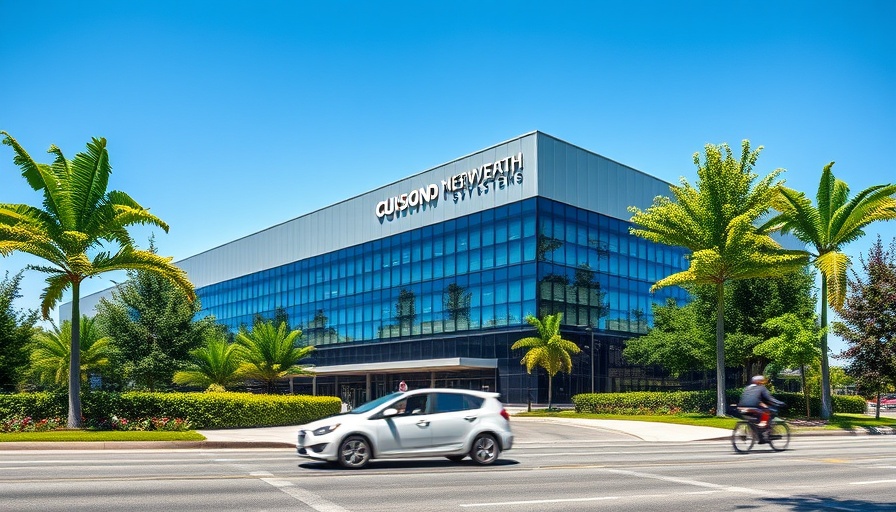
A Bold Step Towards Sustainable Energy: Google’s Nuclear Fusion Investment
In an unprecedented move, Google has agreed to purchase power from a planned nuclear fusion plant, signaling a significant shift towards sustainable energy solutions. As part of this pioneering initiative, Google aims to utilize clean energy to maintain its sprawling tech infrastructure while spotlighting its commitment to addressing climate change. This partnership not only underscores Google's dedication to renewable technology but also positions the tech giant at the forefront of an evolving energy landscape.
What Is Nuclear Fusion and Why Does It Matter?
Nuclear fusion, the process that powers the sun, holds tremendous potential as a clean energy source. Unlike nuclear fission, which involves splitting heavy atoms, fusion combines light atoms, producing immense energy with minimal radioactive waste. As nations and private companies around the world endeavor to harness this scientific marvel, Google’s investment stands out as it demonstrates faith in its potential to supply vast amounts of energy without the environmental costs associated with fossil fuels.
Driving Forces Behind Google's Decision
Several factors play into Google's strategic choice to invest in fusion energy. First, there is an increasing demand for sustainable business practices, especially in light of growing climate concerns among consumers and investors alike. Businesses are under pressure to reduce their carbon footprints, pushing them to seek out cleaner energy solutions. Second, Google’s massive data centers, which consume significant amounts of power, necessitate a reliable and sustainable energy source. By partnering with a nuclear fusion project, Google secures a future-proof energy supply that aligns with its ambitious sustainability goals.
The Role of Silicon Valley in the Energy Transition
Silicon Valley has been a hotbed of innovation across industries, and its influence now extends into energy technologies. The Bay Area's startups and venture capitalists are increasingly turning their eyes towards clean energy, fostering a thriving ecosystem of innovation. Emerging companies are redefining the energy landscape, focusing on sustainable business practices and cutting-edge technologies that promise to change the world. Google’s foray into nuclear fusion exemplifies this trend and may inspire further exploration of alternative energy initiatives in the region.
Potential Barriers: Challenges Facing Nuclear Fusion
Despite the promise that nuclear fusion holds, there are significant hurdles to overcome. The technology is still in its infancy, with many trials needed before it can be deployed on a large scale. Additionally, public perception of nuclear energy remains mixed due to fears stemming from historical incidents involving nuclear power. Educating consumers and stakeholders about the benefits of fusion technology will be critical in ensuring a smooth transition towards its adoption.
Future Predictions: A Shift in Energy Paradigms
Experts believe that Google's partnership could catalyze a shift in the global energy paradigm. As more companies follow in Google's footsteps, the shift towards nuclear fusion could not only reduce reliance on traditional fossil fuels but also create new opportunities for sustainable business practices. Moreover, as nuclear fusion proves to be a viable source of energy, it could influence venture capital funding trends, with more investments funneling into clean energy technologies.
Cultural Shifts: Sustainability in Business
The partnership with a nuclear fusion plant aligns with a cultural shift among consumers and businesses increasingly valuing sustainability. Today's consumers are more informed than ever about environmental issues, leading to a growing demand for corporate accountability. Companies like Google that prioritize environmentally friendly practices may garner greater customer loyalty and enhance their corporate image.
Conclusion: The Smart Move for Business Growth
Google’s groundbreaking agreement to purchase power from a planned nuclear fusion plant is more than just a corporate strategy; it represents a larger trend in the business world where sustainability is becoming essential for growth. By investing in clean energy now, Google not only ensures its operational needs but also defines its corporate mission and values in an era increasingly marked by environmental concerns. Keeping an eye on their moves will provide insights into the future of business innovation and environmental responsibility.
 Add Row
Add Row  Add
Add 



Write A Comment